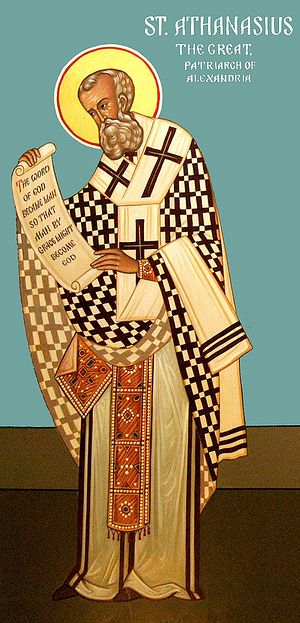Saint Athanasius the Great, Archbishop of Alexandria, was a great Father of the Church and a pillar of Orthodoxy. He was born around the year 297 in the city of Alexandria into a family of pious Christians. He received a fine secular education, but he acquired more knowledge by diligent study of the Holy Scripture. In his childhood, the future hierarch Athanasius became known to Saint Alexander the Patriarch of Alexandria (May 29). A group of children, which included Athanasius, were playing at the seashore. The Christian children decided to baptize their pagan playmates.
The young Athanasius, whom the children designated as “bishop”, performed the Baptism, precisely repeating the words he heard in church during this sacrament. Patriarch Alexander observed all this from a window. He then commanded that the children and their parents be brought to him. He conversed with them for a long while, and determined that the Baptism performed by the children was done according to the Church order. He acknowledged the Baptism as real and sealed it with the sacrament of Chrismation. From this moment, the Patriarch looked after the spiritual upbringing of Athanasius and in time brought him into the clergy, at first as a reader, and then he ordained him as a deacon.
It was as a deacon that Saint Athanasius accompanied Patriarch Alexander to the First Ecumenical Council at Nicea in the year 325. At the Council, Saint Athanasius refuted of the heresy of Arius. His speech met with the approval of the Orthodox Fathers of the Council, but the Arians, those openly and those secretly so, came to hate Athanasius and persecuted him for the rest of his life.
After the death of holy Patriarch Alexander, Saint Athanasius was unanimously chosen as his successor in the See of Alexandria. He refused, accounting himself unworthy, but at the insistence of all the Orthodox populace that it was in agreement, he was consecrated bishop when he was twenty-eight, and installed as the archpastor of the Alexandrian Church. Saint Athanasius guided the Church for forty-seven years, and during this time he endured persecution and grief from his antagonists. Several times he was expelled from Alexandria and hid himself from the Arians in desolate places, since they repeatedly tried to kill him. Saint Athanasius spent more than twenty years in exile, returned to his flock, and then was banished again.
There was a time when he remained as the only Orthodox bishop in the area, a moment when all the other bishops had fallen into heresy. At the false councils of Arian bishops he was deposed as bishop. Despite being persecuted for many years, the saint continued to defend the purity of the Orthodox Faith, and he wrote countless letters and tracts against the Arian heresy.
When Julian the Apostate (361-363) began a persecution against Christians, his wrath first fell upon Saint Athanasius, whom he considered a great pillar of Orthodoxy. Julian intended to kill the saint in order to strike Christianity a grievous blow, but he soon perished himself. Mortally wounded by an arrow during a battle, he cried out with despair: “You have conquered, O Galilean.” After Julian’s death, Saint Athanasius guided the Alexandrian Church for seven years and died in 373, at the age of seventy-six.
Numerous works of Saint Athanasius have been preserved; four Orations against the Arian heresy; also an Epistle to Epictetus, bishop of the Church of Corinth, on the divine and human natures in Jesus Christ; four Epistles to Serapion, Bishop of Thmuis, about the Holy Spirit and His Equality with the Father and the Son, directed against the heresy of Macedonius.
Other apologetic works in defense of Orthodoxy have been preserved, among which is the Letter to the Emperor Constantius. Saint Athanasius wrote commentaries on Holy Scripture, and books of a moral and didactic character, as well as a biography of Saint Anthony the Great (January 17), with whom Saint Athanasius was very close. Saint John Chrysostom advised every Orthodox Christian to read this Life.
The memory of Saint Athanasius is celebrated also on January 18 with Saint Cyril of Alexandria.
Troparion — Tone 3
You were a pillar of Orthodoxy, Hierarch Athanasius, / supporting the Church with divine doctrines; / you proclaimed the Son to be of one Essence with the Father, / putting Arius to shame. / Righteous father, entreat Christ God to grant us His great mercy.
Kontakion — Tone 2
You planted the dogmas of Orthodoxy / and eradicated the thorns of false doctrine; / you propagated the seeds of the Faith watered with the rain of the Spirit. / Therefore, we praise you, Righteous Athanasius.

